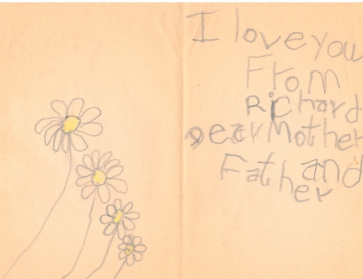How to Record Your Family Stories


My dad on the farm at Czar, Alberta, with his dog Shep.
Years ago my mom mentioned that as a young woman still in school and during a heated argument, she’d taken off the ring that the boy she was fighting with had given her. Mom threw it across the hood of his car, and the ring landed in the trees and grass beyond. The ring was lost forever as is the background to this story.
Listen to me read this post:
I don’t know how this incident came to be and, believe me, I’ve asked around. Who was the guy? What was the disagreement about? Was the ring an engagement ring? I’d love to know, but I never will.

My mom, probably around the time of the ring-throwing incident.
If your life stories are important to you or you think family stories will be meaningful to others, record them. It can be a daunting task, and it’s easier said than done. But with the help of word processors, scanners, and online book creators, writing your stories is more doable than it ever has been.
Start Small
Planning any large project can be overwhelming. If the planning stage becomes too long or too complicated, chances are all your best-laid plans will thwart the project and you won’t even begin.
Avoid Making the Long List
In planning your creation, make a short list of ideas and anecdotes you’d like to write about. In my writing, I’ve used both shorter lists and longer lists to record my thoughts. Consistently I’ve had better success with compiling fewer ideas. I don’t brainstorm. At best, I brain drizzle. This keeps me focused on what’s important to write about. It’s not the boring stories that come to mind first. It’s the interesting ones, the stories that pose questions about lost rings and romantic disputes.
Narrow it Down
You just need a couple great stories chockfull of colourful details to create a memorable piece of writing. Begin with the history that interests you. If certain stories capture your attention, these same stories will probably light up others’ imaginations, as well.
You might want to write about the following:
- How your parents met.
- The skeletons in the closet.
- Your parents’ honeymoon.
- Your grandparents’ emigration journey.
- The family tragedy no one talks about – until now.
Got a family ghost story? I know I’ve got a couple. This is the perfect time and place to tell ghost stories. They’re engaging and fun, and they can tell us a lot about history. You don’t need to believe in ghosts to tell a fantastic ghost story. In fact, the ghosts are just the hook. The meat of the story is in the superstitions of an era and in the tales made up to explain the inexplicable.

My grandma and my Uncle Gerald.
Audio Record Your Stories
Ideally, it’s best to have the person who lived the stories tell the stories. Audio recording these stories allows you to catch the storyteller’s voice and expressions, and then to transfer all that individual richness into print. The story itself is important, but the way the story is told is equally important.
Audio recordings let you use direct quotes straight from the horse’s mouth. When I write up a story for a client, I pepper quotes all the way through my writing. It’s the voice of the family member that the family wants to hear. You can make sure this voice comes through by quoting audio-recorded interviews in your own writing.
Current technology makes it quick and fun to share digital audio recordings with friends and family. This is another perk to audio recording family history.
Ask Questions
Prepare a short list of questions before your interview if you’re able to audio record. Also, if you can, share these questions with your subject prior to the interview. This will give the storyteller a chance to think about what to say. Stick to the questions you really want to know the answers to and to the stories you really want to hear. Interviews like this can easily get off track and become way too long.

A Valentine card from my dad to his parents. You can include images of cards and letter excerpts if you create a book.
Don’t Stop There
You’ve got your stories recorded and typed up? Great! But please don’t stop there, I beg you!
A book is a fabulous gift that will endure. Stories in book form will be enjoyed by many and will be passed onto the next generation. A sheaf of paper folded in half and shoved in a drawer will not. It will be misplaced or thrown away with all the other loose papers that clutter a life.
You’ve put the stories in a file on your personal computer? Nice start! Are you going to invite folks into your office one by one to read from your computer screen after Thanksgiving dinner? You know you had a photo of your grandparents in their backyard somewhere, but you’ll just have to tell the lone screen reader to imagine what that photo might’ve looked like because you can’t find it.
During a family get-together, folks will sit side-by-side, pore over a book, and talk about the memories shared there. They’re less likely to look at that picture-free, coffee-stained paper or that glowing computer screen.

My grandma and my brothers on what is now my front step.
Embrace Technology
We live in a wonderful time during which anyone can simply and affordably create a hardcover book bursting with precious memories and photographs. Use technology to beautifully design your book of stories and to add those photos that help to tell the story. Scanners, personal computers, and online book publishers can help you bring memories to life.
Get Started
Choose a story or two and get writing. Or choose a family member to interview. Audio record that interview if possible. Ask questions about the things you want to know. Dig out those old photographs and review them with your subject. This will get your mom or dad talking, and it will lead places you never dreamed you’d venture together.
If you’re writing on your own with no storyteller other than you, look at old photographs, too. These visual memories will bring up questions and will spark your creativity. Again, pictures will take you farther than you thought you might go.

Mom’s uncles, the Hobden brothers.
It’s a big job, writing your family stories. But if history and memories are important to you, this project is well worth your time. If you want to get it done but don’t think you have time to get the project off the ground, hire me. Get in touch when you’re ready to start and together we can get your stories into print.

Thanks for this Lori, hope it gets me back to my task at hand!!
Gratefully,
Myrna
LikeLiked by 2 people
Be patient with yourself and keep your project goals limited. It’s a big job!
LikeLike
A great template for memory collectors to use as a guide. You’re absolutely right that a book like this is “a fabulous gift that will endure.” My daughter and I spent 2 weeks in London when she was 15. It was a wonderful experience and to commemorate our time together, we made a scrapbook with photos and ticket stubs, programs, and handwritten comments from both of us. It was much simpler than what you’ve laid out here, but it was great fun to choose all the elements, including the paper designs of the individual pages, together.
So, I guess what I’m saying here to your readers is: Go do Lori’s project!
LikeLiked by 1 person
Thaanks for reading and commenting, Amy. Much appreciated!
LikeLike
Pingback: The Joy of Publishing – Lori Knutson